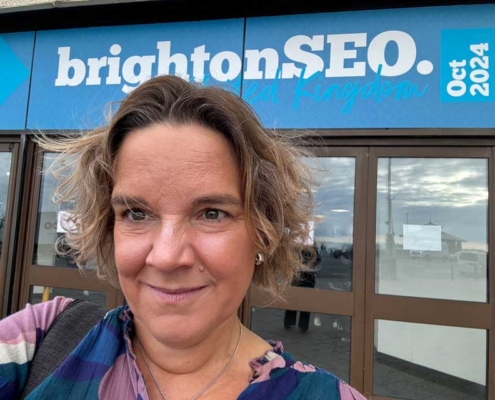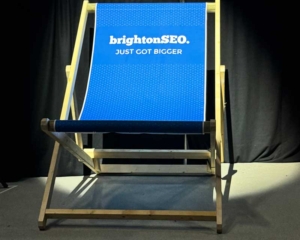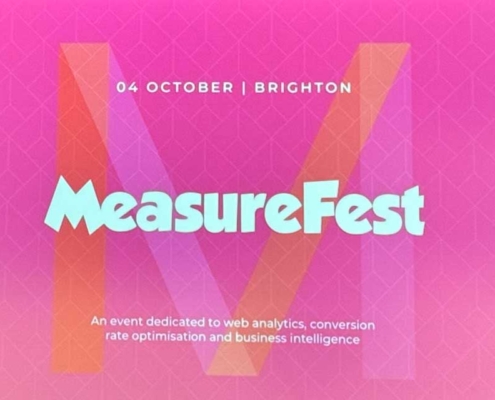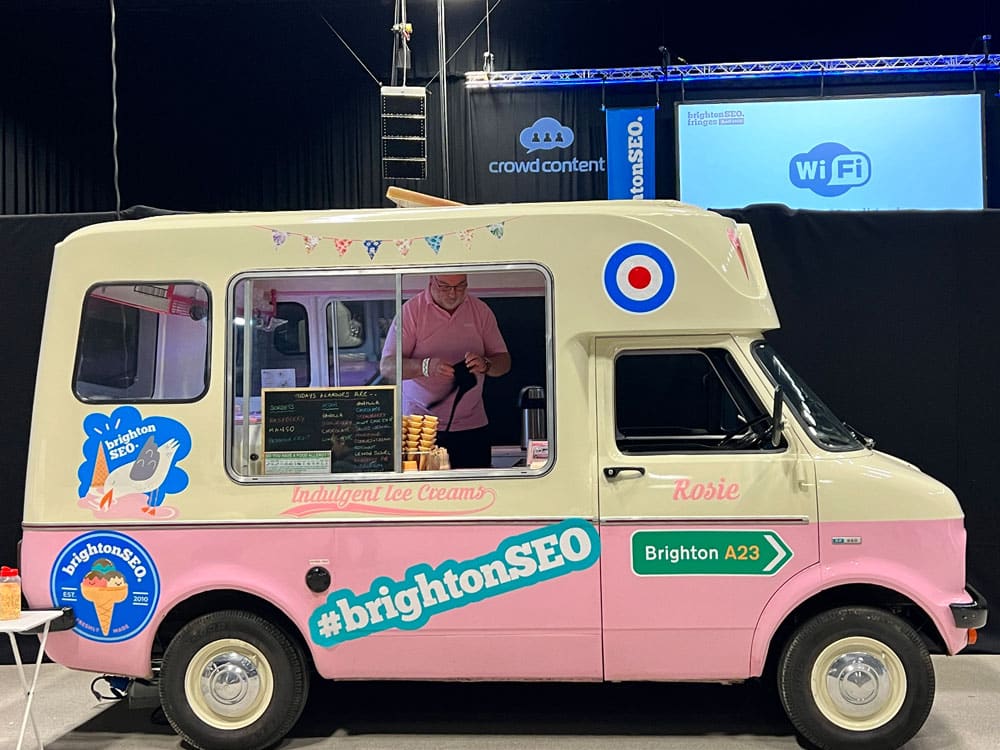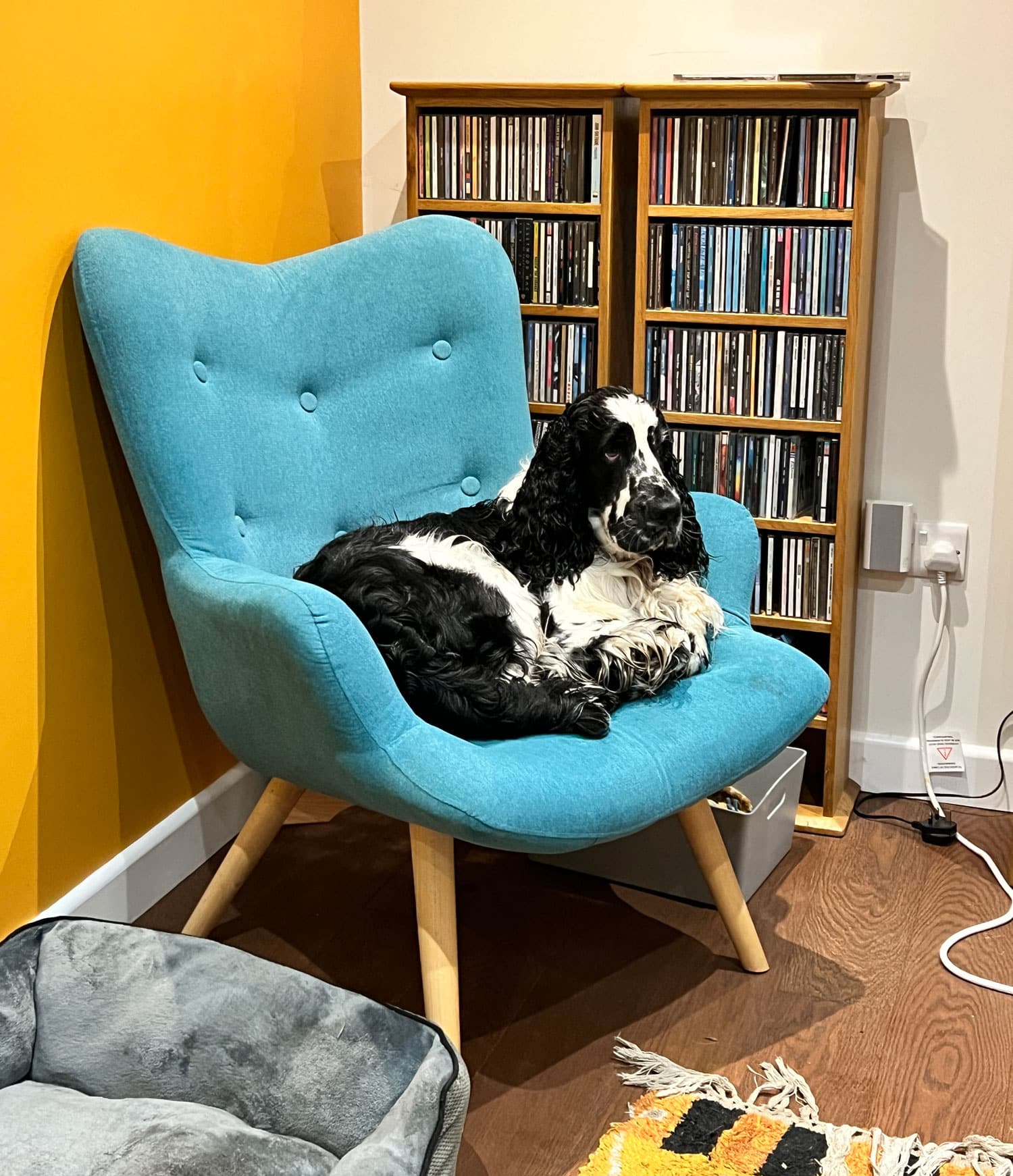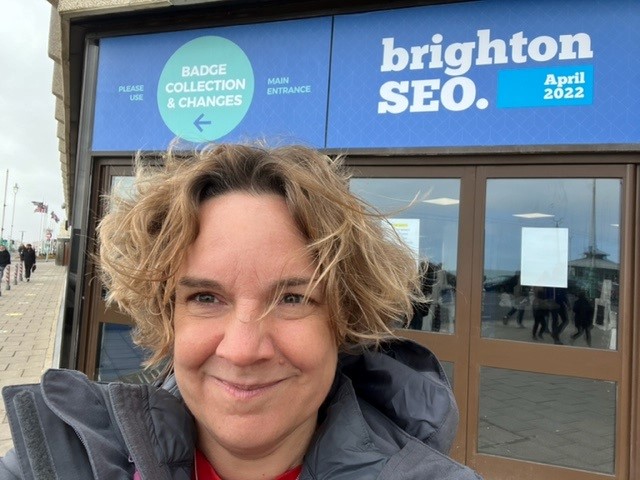Brighton SEO October 2024
E-Commerce Navigation, Conversion Tracking in the Era of Consent and an Omnichannel Marketing Approach.
Brighton SEO Highlights and Learnings – October 2024
There is something about being in a town by the sea and learning stuff. I should know, I spent 4 years at Uni in St Andrews (MA Hons Russian 1995), but unlike the speakers at Brighton SEO, those lectures on Dostoyevsky never quite managed to pull in 4,000 avid listeners. The seafront is not nearly as cold and windy, and thankfully, as my brain would explode, Brighton SEO is just a couple of days twice a year, but the learning is just as intense.
Coming to both “editions” sometimes feels a bit extravagant. The conference runs in the Spring and Autumn, and it would be easy to think that once would be enough. However, when you work in digital marketing, you never really know what you’re doing. Things change daily, and if the platforms themselves don’t change, the ways we find to use them do, so I justify the budget to come to both if I can.
I first made it to Brighton SEO shortly after I started working for myself, back in 2017, and it has proven the perfect way to stay in the loop with the industry. For the first year or so, much of it went over my head. These days, a large part of attending is for reassurance that what we do for our clients is still the current best practice. Also of course, new platforms and ideas emerge, and Brighton is a chance to learn more and decide if it is something we should get involved in.
At the last couple of conferences, there was a lot of buzz around AI, with quite a few people presenting who I suspected were just trying to get on the Speaker circuit by having an opinion. Some of those opinions were useful, and they certainly helped me write some training for my Truro College students about AI in Marketing. This time around, the most common thread seemed to be around “SEO is now a lot more than search engines.” It is fitting that Carrie Rose from Rise at Seven opened the conference, as she’s been, quite rightly, banging on about the role of Social in search for years. This autumn, it was a core theme of everyone’s talks. Yes, Gen Z do a lot of their searching on TikTok, YouTube, Instagram and elsewhere… but these days, so do even the old gits, like me.
Another theme that seemed to run through many talks and discussions was tracking. How do we get reliable attribution with increasing e-privacy laws? Frustrations, still, around GA4 set up and the difficulty of where to give the credit for a Conversion with so many platforms now in the mix. Reassuringly, the advice was pretty much what we have been following. Stick with GA4 and find your way around it, build your own reports and extrapolate the data you do have, to cover the data you don’t. In addition, stop acting as if the only thing that got you a sale is the very last piece of marketing that customer saw. The whole journey, across TikTok, YouTube, Instagram, Google Ads, your site and who knows, maybe even that poster you put up on the Underground, all played a role.
Here are some of the highlights and the key points I took from Brighton this time around. Follow the links for more info and in some cases, the slides:
Website Migrations – Avoiding SEO nightmares
Nikki Halliwell provided a thorough lesson and awesome checklist on what to remember when migrating websites. We’ve done 3 migrations this year so far, and whilst we DID eventually remember all these things*, a checklist as thorough as this would have been VERY useful.
(* OK I almost forgot Google Search Console until I checked for search queries on the new site),
Tina Reis also talked about migrations, or “How to relaunch a website without ruining SEO”. Her slides included a helpful Redirect template.
Tina’s top piece of advice that was new to me was not just to make a list of all the URLs on the current site and note the top performers, which we’d always do, but to think about the Search Intent that brings people to those pages. Have you catered for those types of searches in the new site?
E-Commerce Category Page Optimisation
Category Pages were another buzz term at this autumn’s Brighton SEO.
Alex Jones spoke on how to review your Category Pages to see opportunities for organic uplift. If your competitors’ Category Pages are showing up in SERPs and yours are not, what have they got that you haven’t? Do you need to do any housekeeping on your site to make sure your pages are technically sound? Can you add any content to your blog or Category Pages to help build topical authority? Could you use PR to drive traffic and interest to those pages? Get a good link with anchor text from a strong location and you will see an uplift. Start with this type of natural, authority building, earned media.
Gen Z Online Behaviour
The Youth of Today was a popular topic and Yasmin Burchill opened the discussions with her talk on “The Digital Generation”. This was our first reminder that all channels are likely to be playing a role in decision-making, not just the platforms given credit in GA4. TikTok was up for particular mention and personalised, authentic content is key. This generation does not find personalisation creepy, in fact it prefers advertising that clearly knows who it is talking to. Sustainability is an important influencer, but not above price, and content that resonates with its audience at the right stage of their user journey is vital.
Nathan Height expanded on why SEOs need to diversify beyond Google. 64% of Gen Z use TikTok as a search engine, even 29% of Gen X do. This is because the algorithm is based on User Engagement, not Brand Authority – so you’re more likely to get results that suit you.
Michelle Haslam added to the case for TikTok with her experiences of being an “Accidental Middle Aged Influencer” and encouraged us all to get involved, to forget about needing to be perfect (this isn’t Instagram) and start telling our stories. Not sure I’ll be joining her personally, particularly after watching the documentary about the Nicola Bulley case and TikTok later that night, but good on her for making the most of it, and we’re definitely keeping TikTok in the mix for relevant clients.
Google Ads Advice
Getting into the more nitty gritty, Thursday afternoon was time for some Google Ads specifics. Nathan Ifill spoke on How Smart Bidding Really Works. My favourite part of his talk was his reminder that we come to Brighton SEO to “sharpen our swords” but there was also lots of useful stuff on how to make the most of Smart Bidding, by avoiding pinning headlines and descriptions to let Google do its thing, never messing with the past and only excluding data if absolutely necessary, and let machine learning learn!
Serge Nguele aka The PPC Doctor, talked about Quality Score, and recommended splitting congested ad groups into themes, and pausing any keywords with zero impressions or with ad relevance Below Average, something which thankfully is already on our optimisation list!
Inderpaul Rai talked about times when it might be OK to send Google the wrong data, by monitoring for anomalies, capping outlier values and making sure we are not including any weird spikes in our bid strategies, if they are in fact caused by something other than the ads. An interesting thought as one of our own clients has recently experienced crazy spikes in their phone call conversions and we’ve had to do exactly that.
E Commerce SEO
As we support our clients into Peak 2024, e-commerce talks were high up my list of must-sees. Steve Paine has been in this game as long as me and gave a great talk on “The best of e-commerce SEO – What’s winning in Google?”, running us through this year’s trends from Pink Barbie Birkenstocks to Bottomless Brunch “Day Drinking Outfits” and beyond. Whilst feeling quite glad that I had no urge to own either, I might give Lion’s Mane mushroom supplements a try! Steve’s talk highlighted the need to include relevant, topical content to rank high, and achieve stand out in Google’s new AI Overviews. One “eureka moment” in Steve’s talk was his explanation that people search on Google if they want to do some research. If they just know what they want and aren’t interested in it, they go straight to Amazon. Want to buy a dishwasher? Look on Google. Need dishwasher tablets? Just get the damn things from Amazon. This is obvious in hindsight but why had I never considered it in those terms before?
Paul Norris spoke on how to thrive with smaller budgets, adding to the point that brands that depend solely on Google are going to struggle. My take on this was that being No 1 in Google, at a time when many are also looking on TikTok, Reddit, Insta etc is a bit like being Number 1 in the Singles charts in the old days. It doesn’t mean what it used to in terms of sales! Paul (and others) went on to highlight the importance of having, and managing, faceted navigation to hit the sweet spot where products, filters and search terms overlap. Managing SEO for the many, many pages this might create can be a challenge, but is well worth the hard work at least for the more common combinations of filters your customers are using. ChatGPT can of course help with these kinds of tasks.
Naomi Francis-Parker added to the case for faceted navigation. A really clear, detailed and practical talk, Naomi explained that adding more filters (facets) to category pages is crucial as it allows for a tailored, personalised experience, even without the customer data that is now so much harder to optimise for with e-privacy changes. Which facets do you need? If your search data doesn’t tell you, talk to the sales team on the shop floor.
Peter Richman gave a thorough explanation of what Headless Shopify is, and how it can be used with other CMSs like WordPress to build a more informative site. Adding the design and structure flexibility that Headless Shopify allows, could be one way to address the additional category pages that so many of the other talks have made it clear might be a good idea.
At a time when just about everyone seems to be on Shopify, it was interesting to see a talk specifically on WooCommerce. We have one client still using WooCommerce so Ahmed Bhula’s session on optimising WooCommerce sites for Conversions was on my list. Ahmed took us through a checklist of technical SEO and performance optimisations, on page content and security features that can help, whilst pointing out the weaknesses in WooCommerce’s UX and how to address them to drive more Sales. Do you have a working address look up on your payment gateway? Have you included trust signals in the form of Reviews? Obvious stuff perhaps but as with web migrations, it’s good to have a checklist.
As well as the individual talks, I sat in on the E-Commerce Panel discussions, which included some of the speakers above. Once again, we heard about the importance of faceted navigation, an omnichannel approach and content, content, content. Always a bugbear with e-commerce SEOs, it’s clear online retailers who thrive in the rankings do so by working on their topical authority via informational content, on their sites using FAQs, and adding info on the Product and Category pages, but also on Pinterest, Reddit and other channels. One way to do this is to look at sites like Answer the Public to see what people want to know about your niche, with one example discussed being garden hoses! Gardeners want to know a LOT apparently.
Measurement and Reporting
Technically I spent most of Friday at MeasureFest, a sub thread of Brighton SEO. Reporting is a huge part of what we do for clients, both to show the value of working with us, and to learn from experience and improve the performance of campaigns.
Luca Tagliaferro talked us through the Digital Markets Act, new EU legislation that has had some impact on how Google, Amazon, Meta and other major players serve their own native content above those of others, particularly impacting the travel sector.
Ramona Joita took us through Forecasting SEO results in the GA4 Era, but reminded us that any SEO forecasts should definitely be considered a compass, giving a general sense of direction, rather than a more definite GPS.
Kiera Monaghan introduced us to Matomo Analytics, an alternative to GA4, but quite frankly having seen the UI, and heard it’s not really like-for-like, one Analytics change every ten years is enough and I won’t be recommending a change to any of our clients!
Jonathan Moore gave a whistlestop tour of how to run a detailed GA4 Debugging. Loads of helpful suggestions there, but very much a hands-on talk. I’d recommend watching the video when you can, and, have GA4 open and do the debug as you go.
Implementing Google Consent Mode V2 has been a big task for us this year, setting up Cookie Management Platforms for almost all our clients, so it was reassuring to hear Phil Pearce list the “Consent Mode Mistakes to Avoid” and check we had done things right. Phil had so much to say, his talk time ran out, so I’ll also be checking his slides to make sure we didn’t miss anything!
Behaviour and Psychology
I always love a good talk about how people’s brains interact with marketing, and quite frankly, there were not enough of them this year. Dr Lottie Namakando, (whose studies were in microbiology not psychology as I expected!) made lots of interesting points about how people make decisions, from experience, cognitive bias, emotions, social influence or just “my usual” (default decisions) and how marketers can interact. I came away wanting to analyse every word in our Google Ads, and those of our competitors, to figure out which factors we are all playing on and whether there are new “nudges” to try.
I left Brighton reassured that we do know what we’re doing, our processes are sound and up-to-date and with a long list of new people to follow and ideas to research further. Thank you Brighton SEO and all your brave, knowledgeable and friendly speakers for being generous enough to share your experience. Maybe I’ll even splash out on the third edition and make it to Brighton SEO San Diego one year.

